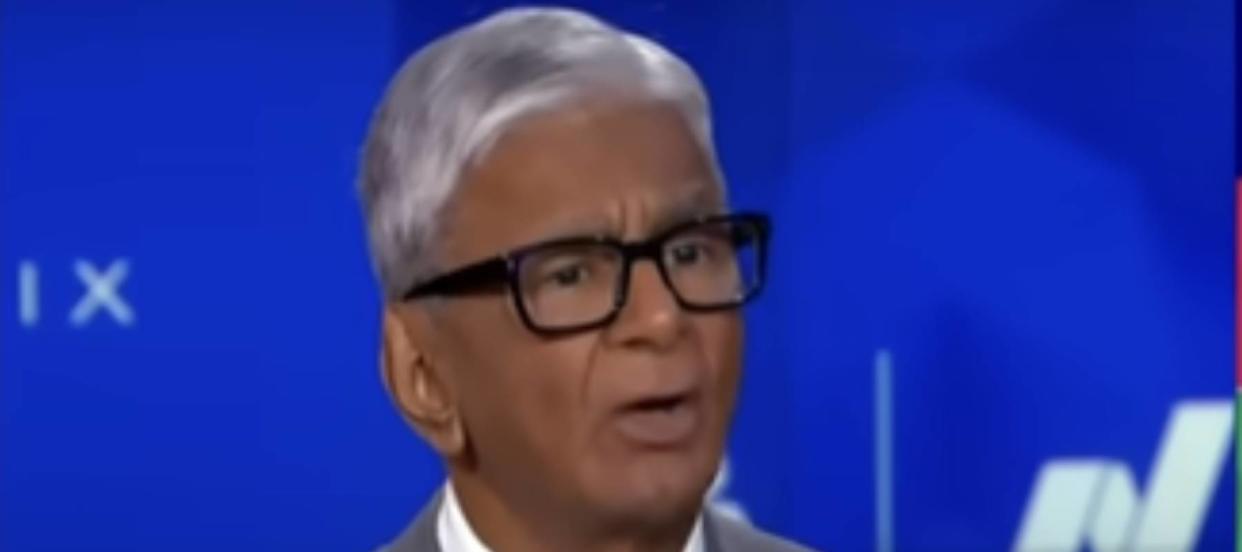‘Reaching a crescendo’: Famed economist sees debt ‘tsunami’ brewing on the horizon — and claims the Fed has the power to stop it (if they learned their lesson from 2008)

A commercial real estate (CRE) “tsunami” is brewing in the United States, according to famed economist Komal Sri-Kumar.
In a recent interview on CNBC’s “Squawk Box,” the president of California-based Sri-Kumar Global Strategies, Inc., a macroeconomic consulting firm, repeated his prior warning that America is barreling towards “a credit event or shock” in the first half of 2024.
Don't miss
Commercial real estate has beaten the stock market for 25 years — but only the super rich could buy in. Here's how even ordinary investors can become the landlord of Walmart, Whole Foods or Kroger
Inflation is still white-hot — use these 3 'real assets' to protect your wealth today, no matter what the US Fed does or says
Anything can happen in 2024. Try these 5 easy money hacks to help you make and save thousands of dollars in the new year (they will only take seconds)
At the heart of this pending crisis is a great wave of commercial property debt, which is about to come due — to the extent of $544.3 billion in 2024 and another $533.2 billion in 2025, according to data analytics company Trepp.
But Sri-Kumar thinks this looming CRE crisis can be avoided if the Federal Reserve takes quick action to cut interest rates and boost the economy. Is he right?
A ‘systemic’ problem for CRE
A lot of the outstanding CRE debt is held by private mortgage lenders, who are really feeling the strain of America’s long-term high interest rates. Sri-Kumar thinks these non-bank lenders are at the heart of the CRE problem.
Treasury Secretary Janet Yellen told the Senate Banking Committee on Feb. 6 that the Financial Stability Oversight Council (FSOC) is “very focused” on monitoring the risks stemming from non-bank mortgage lenders and their potential for failure, per a Bloomberg report.
“They’re reliant on short-term financing that may be a lot less stable than deposits, and in stressful times, their credit lines can be pulled,” Yellen said in response to questions from Democratic Senator Catherine Cortez Masto of Nevada. “There is concern that in stressful market conditions we could see the failure of one of these.”
But Sri-Kumar did not agree with all of the Treasury Secretary’s comments.
“Janet Yellen made a point of saying she did not think it [the CRE problem] was systemic,” he said. “I have been saying for the past year that I think it is systemic, it has been building up and I think it is reaching a crescendo right now.”
It’s not just the U.S. facing unsettling developments in commercial property loans. Sri-Kumar said similar CRE pain is being felt by financial institutions in China — where he said the property market is “in deep dive” — in Japan and Europe, where major lenders are struggling to fund their CRE operations.
“That’s why I think it is systemic,” Sri-Kumar reiterated. “I don’t know why the Treasury Secretary can say [otherwise].”
Read more: Rich young Americans have lost confidence in the stock market — and are betting on these 3 assets instead. Get in now for strong long-term tailwinds
What does this mean for the U.S. economy?
If Sri-Kumar’s CRE tsunami forecast comes true, there’s a chance it could have a spillover effect across the entire U.S. economy.
From there, it depends how the Fed handles it, he told CNBC.
Sri-Kumar thinks the U.S. needs to switch over from quantitative tightening (suppressing money supply to curb inflation) to quantitative easing (increasing money supply and cutting long-term interest rates) “earlier rather than later.”
“Don’t act like you did in September 2008, allowing Lehman Brothers to go bankrupt,” he warned. “Perhaps they learned their lesson, they will cut the rates faster [and] they will switch over to providing liquidity faster.”
If the Fed acts fast and starts cutting interest rates as soon as the April/May FOMC meeting, Sri-Kumar thinks they can “limit the fallout on the rest of the economy.”
He expects to see rate cuts totaling 50 basis points by the end of the year. This would help to stem the CRE debt tsunami — but “there is a cost” to such quantitative easing, he admitted.
“You’re going to give up your fight against inflation,” Sri-Kumar said, with a bold prediction that the inflation rate will end the year “higher than where it is today.”
What to read next
Here's how you can invest in rental properties without the responsibility of being a landlord
‘The biggest crash in history': Robert Kiyosaki warns that millions of 401(k)s and IRAs will be 'toast' — here's what he likes for protection
'It's not taxed at all': Warren Buffett shares the 'best investment' you can make when battling inflation
This article provides information only and should not be construed as advice. It is provided without warranty of any kind.
